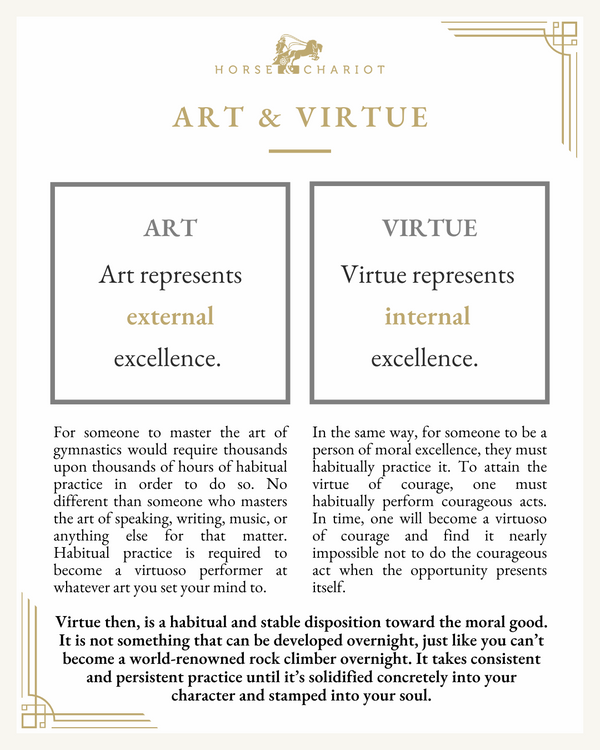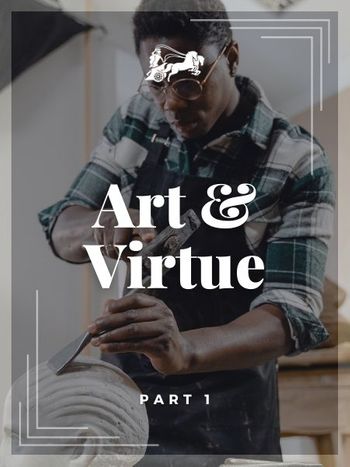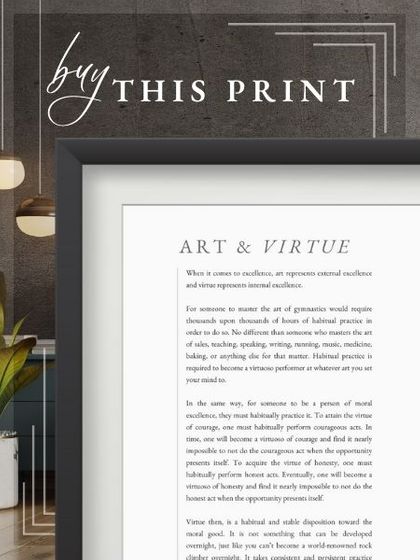All Series > Virtue & Vice > Part 1
Art & Virtue
Teaching of Virtue
Watch: On YouTube
Art & Virtue
When it comes to excellence—
Art represents external excellence, and virtue represents internal excellence.
For someone to master the art of gymnastics, it would require thousands upon thousands of hours of habitual practice in order to do so. No different than someone who masters the art of sales, teaching, speaking, writing, running, music, medicine, baking, or anything else for that matter. Habitual practice is required to become a virtuoso performer at whatever art you set your mind to.
In the same way, for someone to be a person of moral excellence, they must habitually practice it. To attain the virtue of courage, one must habitually perform courageous acts. In time, one will become a virtuoso of courage and find it nearly impossible not to do the courageous act when the opportunity presents itself. To acquire the virtue of honesty, one must habitually perform honest acts. Eventually, one will become a virtuoso of honesty and find it nearly impossible not to do the honest act when the opportunity presents itself.
Virtue, then, is a habitual and stable disposition toward the moral good. It is not something that can be developed overnight, just like you can’t become a world-renowned rock climber overnight. It takes consistent and persistent practice until it’s solidified concretely into your character and stamped into your soul.

Scroll down for the related scriptures, quotes, and lesson plan associated with this teaching.
Copyright © 2022 Horse & Chariot LLC. All rights reserved.
Visual Resource

Related Scripture
“...make every effort to supplement your faith with virtue, virtue with knowledge, knowledge with self-control, self-control with endurance, endurance with devotion, devotion with mutual affection, mutual affection with love. If these are yours and increase in abundance, they will keep you from being idle or unfruitful in the knowledge of our Lord Jesus Christ.” — 2 Peter 1:5-8 (NABRE)
“Every corruptible work will fail in the end. And its worker will go with it. But every excellent work will be justified.” — Sirach 14:20 (CPDV)
“...whatever is true, whatever is honorable, whatever is just, whatever is pure, whatever is lovely, whatever is gracious, if there is any excellence and if there is anything worthy of praise, think about these things.” — Philippians 4:8 (NABRE)
“Show me someone who does a good job [with excellence], and I will show you someone who is better than most and worthy of the company of kings.” — Proverbs 22:29 (GNTD)
“For we are his handiwork, created in Christ Jesus for the good works that God has prepared in advance, that we should live in them.” — Ephesians 2:10 (NABRE)
“Each one, as a good manager of God's different gifts, must use for the good of others the special gift he has received from God.” — 1 Peter 4:10 (GNTD)
“He has endowed them with skill to execute all types of work: engraving, embroidering, the making of variegated cloth of violet, purple, and scarlet yarn and fine linen thread, weaving, and all other arts and crafts.” — Exodus 35:35 (NABRE)
“It is the same with the artist and the craftsman, who work night and day engraving precious stones, carefully working out new designs. They take great pains to produce a lifelike image, and will work far into the night to finish the work. It is the same with the blacksmith at his anvil, planning what he will make from a piece of iron. The heat from the fire sears his skin as he sweats away at the forge. The clanging of the hammer deafens him as he carefully watches the object he is working take shape. He takes great pains to complete his task, and will work far into the night to bring it to perfection. It is the same with the potter, sitting at his wheel and turning it with his feet, always concentrating on his work, concerned with how many objects he can produce. He works the clay with his feet until he can shape it with his hands; then he takes great pains to glaze it properly, and will work far into the night to clean out the kiln. All of these people are skilled with their hands, each of them an expert at his own craft. Without such people there could be no cities; no one would live or visit where these services were not available. These people are not sought out to serve on the public councils, and they never attain positions of great importance. They do not serve as judges, and they do not understand legal matters. They have no education and are not known for their wisdom. You never hear them quoting proverbs. But the work they do holds this world together. When they do their work, it is the same as offering prayer.” — Sirach 38:27-34 (GNTD)
Related Quotes
“We are what we repeatedly do. Excellence, therefore, is not an act but a habit.” — Aristotle
“Seek not the good in external things; seek it in yourselves.” — Epictetus
“The test of the artist does not lie in the will with which he goes to work, but in the excellence of the work he produces.” — St. Thomas Aquinas
“The art of living is more like wrestling than dancing.” — Marcus Aurelius
“Virtue is a kind of health, beauty and good habit of the soul.” — Plato
“I call myself a peaceful warrior because the battles we fight are on the inside.” — Socrates
“Excellence is an art won by training and habituation. We do not act rightly because we have virtue or excellence, but we rather have those because we have acted rightly. We are what we repeatedly do. Excellence, then, is not an act but a habit.” — Will Durant & Aristotle
“He who goes about to reform the world must begin with himself, or he loses his labor.” — St. Ignatius of Loyola
“Goodness is the only investment that never fails.” — Henry David Thoreau
“It is with art as with love: How can a man of the world, with all his distractions, keep the inwardness which an artist must possess if he hopes to attain perfection? That inwardness which the spectator must share if he is to understand the work as the artist wishes and hopes... Believe me, talents are like virtues…And they are only recognized and rewarded when we have practiced them in secret, like a dangerous mystery." — Johann Wolfgang von Goethe
“Excellence is not a gift, but a skill that takes practice. We do not act ‘rightly’ because we are ‘excellent’, in fact we achieve ‘excellence’ by acting ‘rightly’.” — Plato

Lesson Plan
For your family, small group, or personal reflection.
STEP 1: Introduction
Example: "I'm going to play a short video on the topic of art and virtue. After the video, I have some questions to gather your thoughts and get the discussion started. We’ll then wrap up with a closing prayer."
STEP 2: Watch Video (or listen)
Watch (or listen to) the video of the teaching (cast to your TV via YouTube). If time allows, also read the teaching, related Scriptures, and related quotes.
STEP 3: Discussion / Reflection
- How is getting better at virtue similar to getting better at art (or any other special skill)?
- How do you develop good habits internally and externally?
- How might one go about building the habit of being courageous?
- What areas of your life would you like to grow in virtue the most and why? (Examples: practicing more self-control, discipline, orderliness, positivity, prayerfulness, etc.)
- What habits can you start practicing to become a virtuoso in those areas?
- Did any of the related Scriptures or quotes stand out to you (please elaborate)?
- Any other thoughts you’d like to share?
STEP 4: Wrap Up & Closing Prayer
Summarize and wrap up the discussion. Then, conclude with a sincere and humble prayer from the heart.

Buy the print of this teaching.
Join one of our free online training events.
Shop all our teachings of virtue prints.
Explore other virtue-based products.
Never miss a teaching — get all new teachings of virtue sent to your inbox free!




